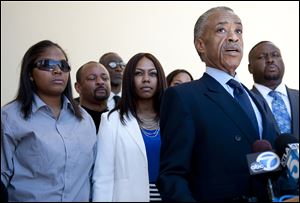
Rodney King eulogized as symbol of healing
7/1/2012
The Rev. Al Sharpton, right foreground, speaks to reporters before the public memorial service for Rodney King in the Hollywood Hills. Behind him Saturday are King's daughters Tristian King, left, and Laura Dene King.
LOS ANGELES -- Hundreds of mourners remembered Rodney King, a symbol of racial tension and catalyst for sweeping law-enforcement reforms after his 1991 beating by Los Angeles police officers, as a figure of national healing at a public memorial before his burial on Saturday.
"He tried to use his scars to heal a nation," the Rev. Al Sharpton said outside the Forest Lawn Hall of Liberty in the Hollywood Hills.
King was found by his fiance, Dee Cynthia Kelly, drowned on June 17 at the bottom of his backyard swimming pool in Rialto, Calif., about 50 miles east of Los Angeles. He was 47.
Police have said they found no initial evidence of foul play or outward signs of suicide and were investigating his death as an accident.
Results of toxicology and tissue studies were still pending, authorities said, and there were questions about how King, an avid swimmer, drowned in his own pool.
The beating of King was caught on videotape and was widely replayed.
More than a year later, four officers charged with felony assault in the beating were acquitted by a jury with no black members. The verdict sparked one of the costliest and deadliest race riots in U.S. history.
During the unrest, which left more than 50 people dead and caused more than $1 billion in property damage, King famously pleaded for peace by asking, "Can we all get along?" His famous words were embroidered on the lid of his casket, next to a portrait of him.
Mr. Sharpton, who delivered the eulogy, said before the funeral that King never showed bitterness to the officers who beat him.
"People should not be judged by the mistakes that they make, but by how they rise above them," Mr. Sharpton said. "Rodney had risen above his mistakes, he never mocked anyone, not the police, not the justice system, not anyone."